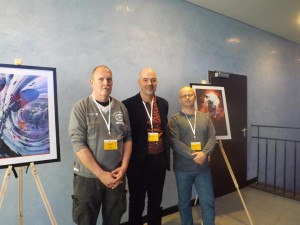This is me at Dortcon, with the other guests of honour, artist Lothar Bauer on the left of the picture (a man of few words, who says his pictures speak for him: we are flanked by two of them here) and fellow SF writer Karsten Kruschel on the right.
As with Sferakon last year in Zagreb, I was a little daunted in prospect by the idea of attending a convention whose primary language would not be English, but (also as with Sferakon) I was made extremely welcome, people put themselves to a lot of trouble to make sure I was included, and I had a great weekend. Special thanks to Arno and Gabi (my main hosts), Michael who first suggested inviting me, and Gregor who acted as my interpreter when one was needed (making me feel like some kind of international statesman, as he murmured into my ear.)
I know a huge amount of work and worry, over a long period of time, goes into planning these events, which most attendees (including me) don’t really see. What I see, and most attendees see, is a little peaceful island, where gentle and imaginative people can gather for a couple of days of conversation and friendship and playfulness.
This was my first real visit to Germany. Fascinating listening to German spoken all around me. Perhaps because, from an early age, my sisters and I were cared for by German au pairs, I’ve always liked the sound of the language. I find it musical, where many English people find it harsh, and could quite happily just sit and listen to its cadences, even if I didn’t have someone to interpret. The tantalising thing about it is that, though I can’t understand it, it’s so obviously a close cousin of English that I can’t quite let go of the idea that, if only I tried hard enough, I could.
It’s interesting how every country has its stories, its past events, it’s preoccupations, which it must keep going over and over, just as individuals have events in their own lives that they must visit and revisit over and over: the old DDR and what had happened to it when Germany was unified, for instance, was clearly one such topic, even more than twenty years on.
My fellow writer and guest of honour Karsten grew up in the DDR. He told me all SF in the DDR had to depict a socialist future (so as not to violate the Marxist creed of the inevitable triumph of socialism). When he studied for a PhD thesis on dystopian literature, he had to have special permission to look at George Orwell’s 1984, which was held in the university library but was forbidden to the general public. He had to go to a special room to read it.
Now to me, that sounds like a scene from an SF novel in itself.
